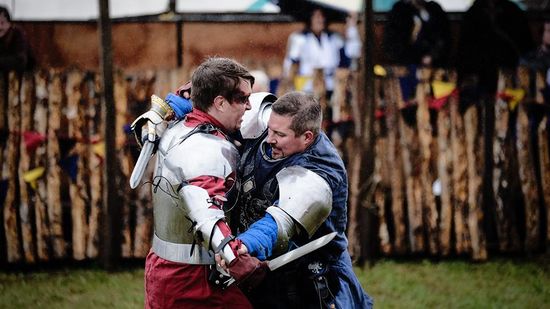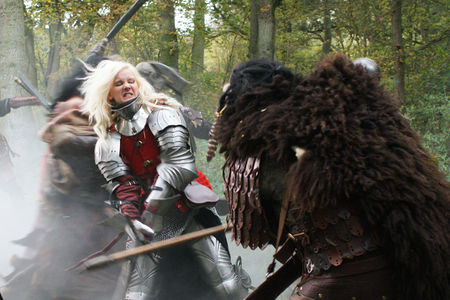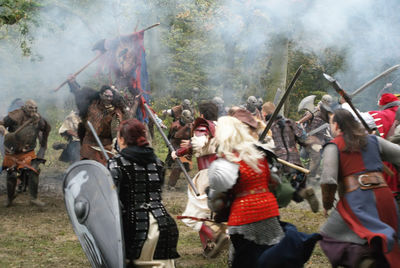Event safety
Fighting safely
- You must pull all of your attacks so that they land with virtually no force
- You must avoid hitting the groin, neck or face
- Try to avoid hitting the breasts or head where there is an alternative target
- You must avoid combat if you are drunk
It is essential that you know how to fight as safely as possible using the practices common to most British live roleplaying events. If you are new to live roleplaying then please speak to a member of our GOD crew and they will arrange a suitable demonstration for you so that you can be confident that you are following all the rules:
- When you use a weapon in combat, you must pull the blow so that it lands with negligible force. Your opponent should feel a light touch and nothing more.
- You must not thrust with any weapon unless it is a thrust-safe pole-arm.
- You must avoid hitting the groin, neck, or face; you should avoid aiming at the breasts or head where there is a viable alternative target.
- You must not strike another character with the pommel or hilt of your weapon. You must not grab or trap an opponent’s weapon when they are wielding it.
- You must not attempt to parry an arrow or bolt with a weapon.
- You must only throw a weapon if you know a Profound Decisions weapon checker has approved it for throwing.
- If you are using a bow then you must follow the bow safety guidelines; you must not pull the bow to full draw when shooting at a character who is nearby and must not aim a bow or crossbow at the head.
- If you are using a flail then you must drop the weapon immediately if it becomes entangled in your opponents weapon or costume.
- If you are not using a one-handed weapon then you must follow the appropriate weapon grip rules for the category of weapon you are using.
- You must avoid combat if you are drunk.
These rules exist to reduce the dangers inherent in combat at a live roleplaying event to an acceptable minimum, but they do not constitute a guarantee of safety. Our safety record is excellent, but by choosing to attend an Empire event, you agree to accept the risks inherent in taking part in a full contact sport.
Battle Safety
It is the responsibility of everyone taking part in a battle to consider their own safety and that of the participants around them. All participants in battles should adhere to the instructions of referees and other members of crew, who have your safety and enjoyment as their primary consideration. The following are points that all participants should bear in mind when taking part in combat activities at Profound Decisions events:
- Hydration: You should endeavour to bring water with you onto a battlefield and take on more water during lulls in fighting.
- Trip hazards: When fighting you have a better view of the ground behind your opponent than they do, you should under no account deliberately push opponents over obstacles in order to gain an IC advantage, OOC safety always comes first.
- Exhaustion: Battles are strenuous physical activities, you should endeavour to fight within your limits and take breaks where needed to avoid over-exerting yourself.
- Footwear: Battles at Empire events primarily take place in woods, you should strongly consider sensible supportive footwear for taking part in battles
- Suncream: While the woods do provide cover from the sun, some battles will occur on hot days and you should therefore prepare appropriately.
Weapon checking
- All your weapons must be checked at every event
You must take all weapons, bows, crossbows, shields, and projectiles (arrows and bolts) that you have brought to an event to a weapon checker to have them checked against our weapon checking guidelines. These items must be checked at every event you attend. If a weapon checker does not approve your equipment for use then you must put the item in your vehicle or leave it at GOD for the duration of the event. If you are not satisfied with the decision then you may request a second opinion from our head weapon checker. The decision of the head weapon checker is final.
If a weapon checker approves an item then they will attach a coloured elastic band to the item. We change the colour of the elastic bands for each event. You must not use any item for melee purposes unless you know it has been approved for that use.
You can carry items such as a walking stick, wooden staff or banner but they must never be used in melee, so they do not need checking with the weapon checkers. We do not allow anyone to have metal weapons at events except for display or sale purposes, so you may not carry one without our prior approval for each event.
Armour
- Metal armour must be of a grade where it will not tear in use revealing sharp edges.
- Metal armour must have its edges rounded off in such a way there are no burs or snags which could damage props or players
- There must be suitable straps and attachments so armour does not come loose
- There must not be any protruding sharp decoration such as spikes that could damage weapons or people
Any suit of armour that you use at an event must not have sharp protruding edges. If you are in any doubt about the safety of your armour then you should have it examined by a weapon checker.
Grappling, body contact and shields
- You must not grapple or make bodily contact while fighting
- You may hook shields with an axe but may not grab weapons with your hands
- You may push with a shield but you may not shield barge
You must try to avoid body contact with other players during combat. You must not grapple or trip another player.
If there is a referee present and you and your opponent have spoken to the referee immediately before the fight started to indicate that you are both happy to grapple and use other techniques then you may do so. Both participants must give explicit permission to grapple to the ref before the fight starts, and you can only do this in a small, carefully planned fight between individuals such as a duel or display, you may not use grappling or body contact on the quests, skirmishes, or battles.
You may hook a shield with an axe or similar hooked weapon, to pull it out of the way. You should be aware that some LRP axes are specifically designed and built to support this, the axe head is heavily reinforced with leather to allow it to withstand the force. If your weapon is not designed for it, you will break the weapon by doing this.
You may push with a shield, if you are moving at a slow walking pace or less but you must not shield-barge, you cannot run into another player using a shield or other similar item. You may not use a shield as a weapon to strike another player.
Non-contact
- You must not touch or physically attack anyone with their hand in the air
- You can put your hand in the air to indicate that no one should touch you
- If you do this, your character is reduced to 0 hits and is now dying
- Profound Decisions do not guarantee that you will not be hit
You may have health reasons that mean you wish to avoid becoming involved in combat. If this is the case you may put your hand in the air to indicate that you do not wish any player to make physical contact with you. This is called being non‑contact and, while its use is uncommon at events, it is important that you understand the rules so that you can ensure the safety and well-being of other players.
If a fight starts near you then you can put your hand as high in the air as you can and keep it there, to indicate that you are non‑contact. If you indicate that you are non-contact, then you immediately lose all your global hits and start dying. You may move yourself out of the immediate melee before lying down or leaning against a tree or similar or may remain standing with your hand clearly raised. You may cease being non-contact at any point by putting your hand down, but you should not do this if you would become involved in the same melee.
It is up to the individual when or if they choose to go non-contact. There is no requirement at all to go non-contact at the start of a fight, or because a fight has happened near you. It is perfectly acceptable to move away from a melee while remaining in-character and mobile and only become non-contact if a character moves to attack you.
If you see any player indicate that they are non-contact then you must not hit them with a melee weapon, fire a bow or crossbow at them, or touch them. The player is still IC and you may roleplay with them normally but you may not hit or touch them while they are non‑contact.
It is important to note that nobody can guarantee that you will not be hit while you have indicated that you are non-contact. A live-roleplaying melee is a deeply confusing experience and mistakes can happen. If you have health reasons that make it critical that you are not hit with a latex weapon then you may need to avoid combat entirely and you must decide whether the event is safe for you to attend at all.
General safety
- Health and safety is everyone’s responsibility
- Do not attempt to defend a tent
Health and safety is everyone’s responsibility at an event. Be aware of any potential hazards, and if a fight begins then move away from tents, guy ropes, and other hazards such as tables, chairs, and braziers. It is not enough to be aware of such dangers when fighting; you must move away from such dangers to ensure that other participants in the fight are not at risk.
If your character has fallen over in a fight then you should crawl out of the way of the combat. You must make sure that anyone who has fallen over has room to move away.
Please ensure that you pay particular attention to safety when fighting near tents. Tents present an additional hazard for anyone fighting so you must not use them as a defensive feature.
All tents are considered to be highly flammable in the Empire setting, so your character can easily fire a tent to force the occupants to come out. Obviously, you must not set fire to any object of this kind at an event; you must obtain a referee if you want to force other characters to come out of a tent in this manner.
The nature of an event is such that trip hazards such as uneven ground, tree roots, guy ropes, and tent pegs are unavoidable. Given the poor lighting conditions that prevail at night, one of the most important safety precautions you can take is to ensure that you wear footwear that combines good grip with firm ankle support.
Safety Calls
- There are two safety calls MAN DOWN and TIME FREEZE
Empire uses two safety calls to help keep fights as safe as possible. These are fully described on the calls page.


